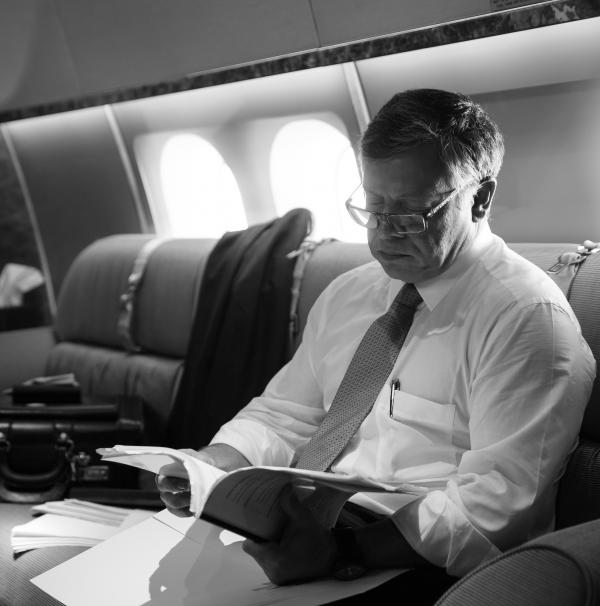Remarks by His Majesty King Abdullah II At the IISS Regional Security Summit: The 7th Manama Dialogue

In the name of God, the Most Merciful, the Compassionate,
Thank you, John, and thank you all. I am delighted to be with you today. Allow me to express my very great appreciation to His Majesty King Hamad bin Isa Al Khalifa ... and His Royal Highness Prince Salman bin Hamad Al Khalifa ... our noble and generous hosts, and the leading spirits of this eminent regional forum.
My friends,
Our region has been at the nexus of world events for thousands of years. Today, the world's future, as well as its past, meets here. Not only our countries … but the entire global community … will be shaped by the roads we take … To bring economic and political empowerment to millions of young people … To ensure that moderation and respect triumph over division and aggression … To expand opportunities and prosperity across our societies.
And it won't be enough to avoid the dangers. We must also move ahead with positive action. Creating millions more jobs, and better jobs … Higher standards of living, for more people … New access to modern skills and knowledge ... And an end to the heavy price of wars and division. These are not only social concerns. As all of you know, they are the strength behind the strength of national security policy.
But if the challenges are real … so are our strengths. The Arab World of today has tremendous resources and human capabilities ... A long history of global engagement ... and a deep heritage of social responsibility and justice. These are tools that we can use, and must use, to shape the Middle East of the future. In all this, united effort is key.
My friends,
Our region will not enjoy security and stability unless we solve the Palestinian Israeli conflict, and Arabs, Muslims and Israelis find peace. We are committed. The Arab Peace Initiative offers more than just an end of conflict … It offers a lasting peace, that will allow Israel to have normal relations with 57 Arab and Muslim countries, and will free our region from the threat of war and conflict.
But this opportunity cannot last forever. Geographic and demographic changes are threatening the essence of the initiative: a two state solution, which will guarantee the Palestinians the freedom and statehood they have long been denied, and will ensure for Israel the security it seeks.
The stakes are high. As a solution continues to elude us, faith in negotiations, as the only path to peace and justice, is eroding. And if hope is killed, radical forces will prevail. The region will sink into more vicious warfare and instability … threatening security far beyond the borders of the Middle East.
This is why it is essential that we rescue the new round of negotiations between the Palestinians and Israeli. The talks were launched in Washington in last September, against a backdrop of pessimism. We all knew how difficult it was to restore trust between the parties, and move forward. But we also knew that a vacuum in peace efforts will be too costly … And we hoped that all sides had realized that the status quo could not be sustained … That it only means sliding into darkness.
But the talks hit a major deadlock even before they got to address the substantive issues. Israel would not extend the moratorium on settlement buildings … And the Palestinians could not remain engaged in negotiations, while new settlements were changing facts on the ground, and compromising the viability of the future Palestinian state.
We can, and must, end the deadlock. To do so, we do not need new solutions. We need will, we need commitment, and we need courage to make hard decisions. The building of settlements has to stop, and the parties must sit around the negotiation table … To discuss territories … borders … security … refugees … Jerusalem, and other final status issues. Only through such serious negotiations, will we get to the end game: An independent and viable Palestinian state, living side by side a secure Israel, that is accepted and accepting, in a region of peace.
The alternative is new conflicts that will reverberate far beyond the borders of the Middle East … Conflicts that will threaten the strategic national interests of the United States, Europe and the rest of us in the international community. The world has already been dragged into regional conflicts … And it will certainly be involved in new confrontations, that will erupt in this environment of frustration and tension.
My friends,
For our region's future, for the world's, we must help the parties keep their eyes on the prize. There is no excuse for politics-as-usual. You, who are part of the Manama Dialogue, understand the deep security issues at stake. If we are going to meet the urgent demands of this century … If we are to solve the challenges that are on your agenda here this week … our region must have a platform of peace and security. Your leadership, here and in the days ahead, can help build the regional and global architecture to achieve these goals. I urge you to contribute your wisdom to the solutions … and I wish you the greatest success.
Thank you.


